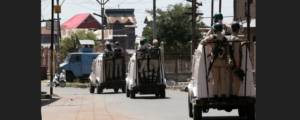RSF condemns Kashmir media blackout by Indian authorities*
*Reporters Without Borders condemns a media blackout imposed in Indian-held Kashmir, and the harassment of journalists by local authorities, since 8 July when a separatist military commander, Burhan Wani, was killed in the south of the region. The organization urges the Indian government to stop using security and law and order as pretexts for cracking down on the media.*
At least 45 civilians were killed and more than 1,600 injured, including women and children, in protests and clashes that broke out on 8 July.
“*Now local media outlets, which were discharging their professional duties of reporting facts from ground zero, are under severe attack,” *Kashmir-based journalist *Gowhar Geelani * wrote on the news portal DailyO.* “Their professional work has unnerved the state government.*”
During the night of 15 July, police raided the offices and printing plants of Kashmir newspapers including *Kashmir Times, Greater Kashmir, Kashmir Observer* and *Rising Kashmir *and seized a large number of printed copies.
During the raids, 50,000 copies of the daily *Kashmir Uzma* were seized. “*Authorities on Saturday midnight gagged the Greater Kashmir by raiding the Greater Kashmir Corporate office at Rangreth on city outskirts *,” the newspaper said on its website. Police arrested the *Greater Kashmir * printing press foreman Biju Chaudary and two other employees.
“*The policemen seized the plates of Greater Kashmir and more than 50,000 printed copies of Kashmir Uzma and closed down the GKC printing press,*” it added.
Police also seized copies of *Rising Kashmir * early on Saturday and raided its press at Sheikhpora in central Kashmir’s Budgam district.“*A police party from Budgam police raided the press to seize the copies of Rising Kashmir and other publications*”
*Rising Kashmir* said on its website. “*As the staff had left after
printing the copies, police took into custody all the employees including Foreman Mohammad Yousuf and asked him to identify the distribution site.*”It said the distribution truck was seized and its driver detained. Staff were released after being harassed and intimidated, it added.“*The government of the chief minister, Mehbooba Mufti Sayeed, must stop justifying its flagrant violations of press freedom on the pretext of security,”* said Benjamin Ismail, head of the Reporters Without Borders Asia-Pacific Desk.
*”The media are not behind these disturbances and even less are they a destabilizing influence in the region. The authorities cannot restore peace in the region by eliminating criticism of the government, which will always find a means of expression.*
“*The refusal to understand this is an admission that there is no genuine policy in place to restore peace. Moreover, the curfew now in force should not affect the work of the media.”*
*Editors condemn “press emergency” *
In an attempt to prevent the dissemination of news and information, the government has cut mobile Internet access since 16 July, and the private mobile network was cut from 14 July throughout the region. In most parts of Kashmir, cable services and the mobile Internet have been disabled since 9 July. No cellphone services except Bharat Sanchar Nigam Limited are functioning.
In response, editors and owners staged a sit-in at Press Enclave in
Srinagar, the summer capital of Kashmir, on Saturday and strongly condemned what they called the imposition of a“*press emergency*”.A joint statement issued by the editors and owners later said: “A government spokesperson, when contacted during the meeting, conveyed that ‘*in view of apprehensions of serious trouble in Kashmir Valley in next three days aimed at subverting peace, strict curfew will be imposed and movement of newspaper staff and distribution of newspapers will not be possible*’.”
In 2010 and 2013, newspapers based in the valley were banned from publishing
<https://rsf.org/en/news/news-media-and-internet-totally-censored-kashmir>
and their freedom of movement was severely restricted. Some newspapers were seized and their distribution was blocked, while the authorities refused to grant media employees an exemption when curfews were in force. India continues to languish in the bottom third (133rd of 180 countries),
of the 2016 World Press Freedom Index <https://rsf.org/ranking> published by Reporters Without Borders, because of the number of journalists killed and the impunity for crimes of violence committed against the media.

